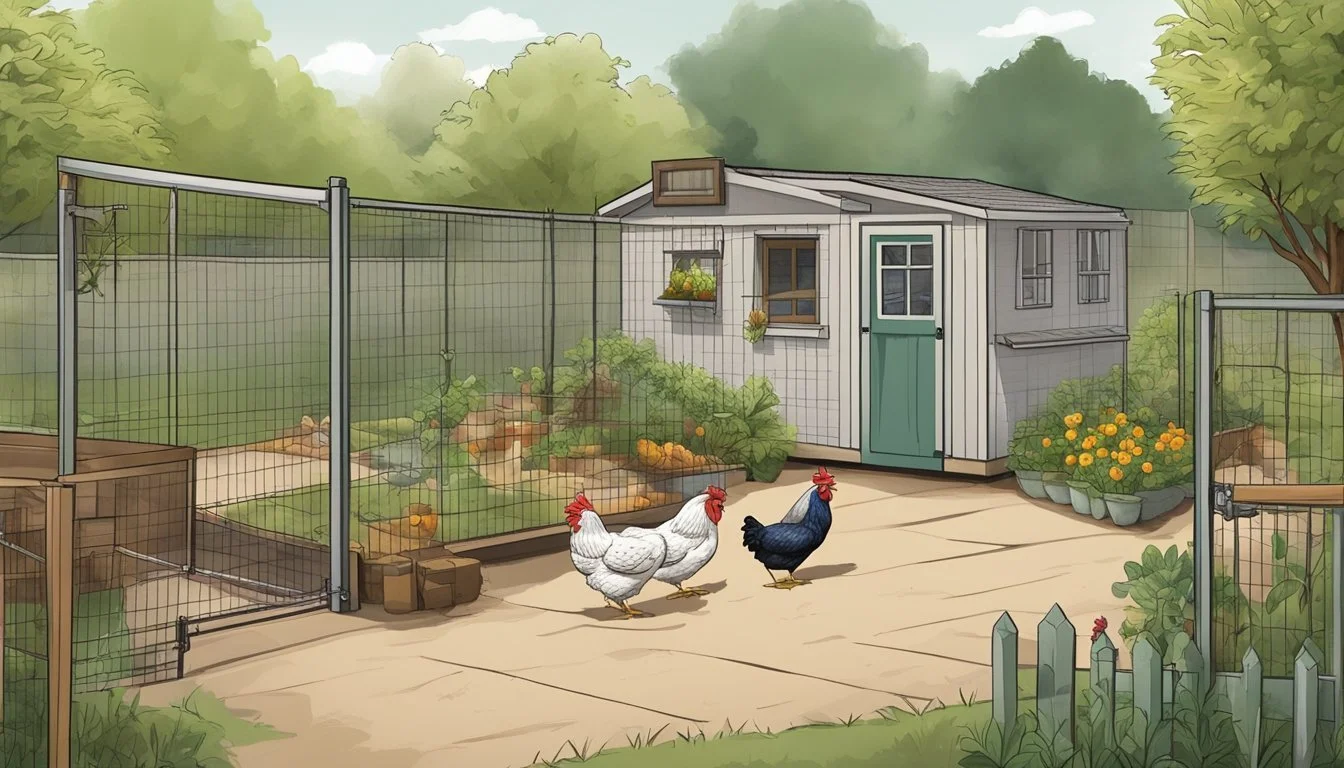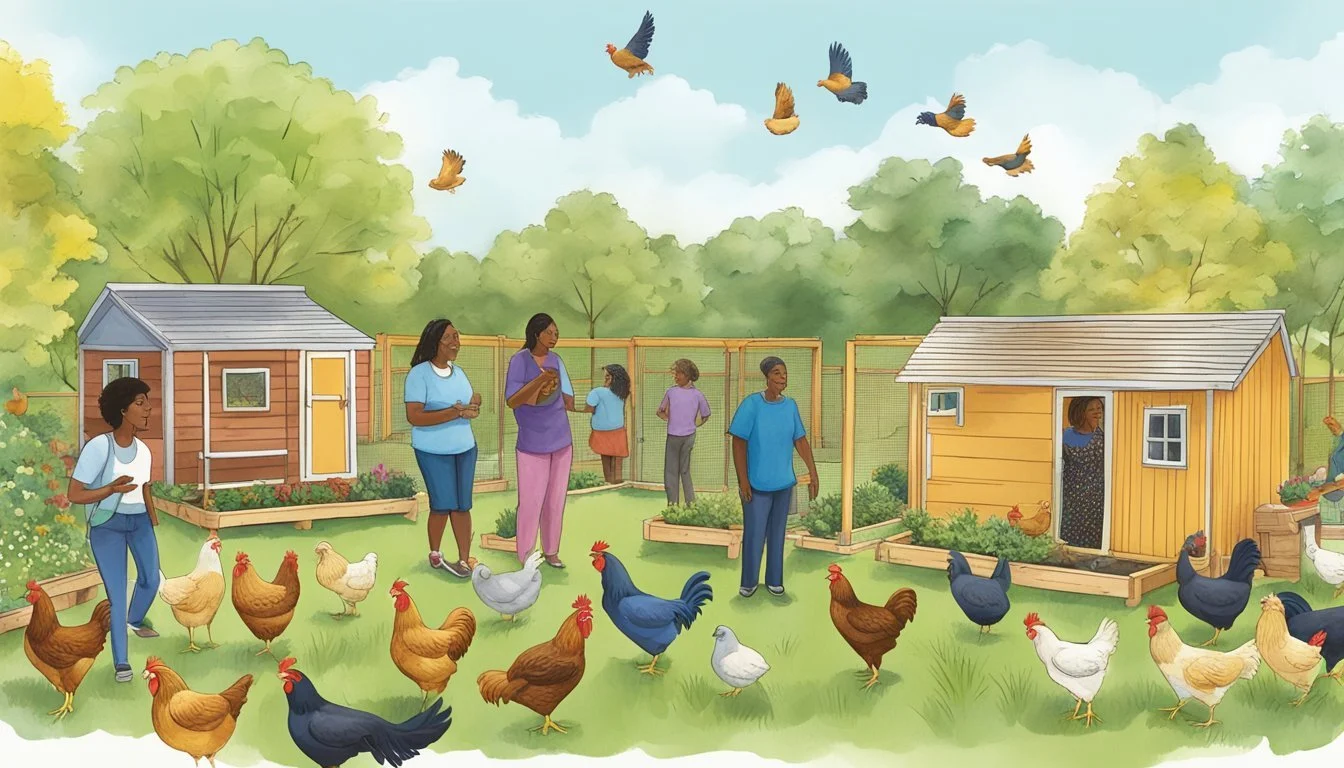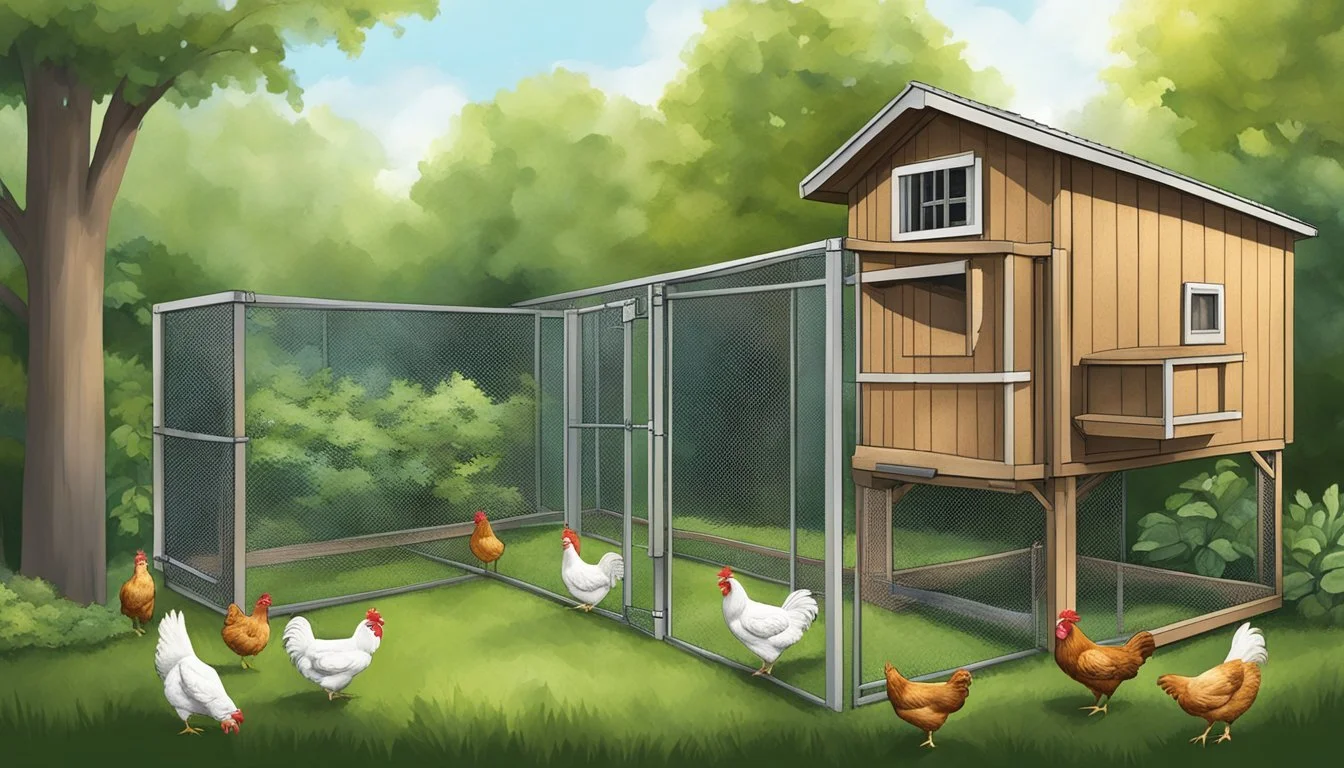Keeping Backyard Chickens in St. Louis, MO
A Practical Guide to Urban Poultry Farming
In St. Louis, Missouri, the practice of keeping backyard chickens has gained popularity as part of an urban homesteading movement. Residents have embraced the concept of raising hens for fresh eggs, natural pest control, and as a source of joy. The city's ordinances have evolved to accommodate and regulate this pastime, ensuring that urban poultry keeping is both responsible and beneficial for the community. Adhering to these rules, individuals can enjoy the advantages of fresh produce while maintaining harmony with neighbors.
The regulations in St. Louis allow for the keeping of hens, but not roosters, to prevent noise disturbances. The coops and runs are required to be placed in the backyard and must maintain a distance of at least 10 feet from property lines. Moreover, the size of the chicken coops and runs is limited to a maximum of 50 square feet. These guidelines are designed to prevent any public nuisance and to promote the welfare of the chickens.
Furthermore, the city has stipulated a maximum number of chickens that can be kept based on the size of the property. Ordinance 70608 permits city residents to own up to eight chickens, although previous regulations capped the number of all animals, including chickens, dogs, cats, and rabbits, at four per city parcel. This shift in ordinance underscores St. Louis's growing acceptance of backyard poultry as a facet of urban living.
Understanding Local Chicken Laws
When considering raising backyard chickens in St. Louis, Missouri, it is crucial to understand the local ordinances governing the practice to ensure compliance with the law and to maintain community standards.
Deciphering Ordinance 70608
Ordinance 70608 is a pivotal regulation affecting St. Louis residents who wish to keep chickens. This ordinance permits city residents to own up to eight chickens, although the exact number allowed may vary based on property size; larger flocks necessitate a non-commercial kennel permit.
Permits and Property Regulations
Property Size and Chicken Limits:
Properties less than 20,000 square feet require a permit from the Health Department for chicken keeping.
Larger properties may keep more chickens, subject to further regulations.
It's important to note that permits ensure adherence to public health standards, and property regulations help maintain community cleanliness.
Restrictions on Types and Numbers of Fowl
Keeping chickens in Missouri comes with specific restrictions regarding the types and numbers of fowl allowed:
Roosters are generally prohibited in urban and suburban settings due to noise concerns.
Ducks, rabbits, and other domestic animals may also be subject to local ordinances.
Residents should verify current laws to understand the full scope of restrictions.
Addressing Public Nuisance Concerns
Backyard chickens may lead to potential public nuisance issues. St. Louis ordinances are in place to prevent such situations:
Cleanliness standards must be upheld to avoid attracting pests.
Noise and odor must be controlled to not disturb neighbors or create health hazards.
These regulations aim to balance individual interests with community welfare.
Involvement of Municipal Bodies
Local municipal bodies, including the St. Louis Food Policy Coalition and government officials like Alderwoman Cara Spencer, have been crucial in shaping and advocating for chicken laws:
These bodies play roles in updating ordinances and informing the public.
Prospective chicken owners should consult these sources for guidance and recent updates.
Staying informed about the involvement of municipal bodies can be beneficial for those navigating local chicken laws.
Setting up Your Chicken Coop
In St. Louis, MO, you must adhere to specific guidelines to ensure a hospitable and legal environment for keeping backyard chickens. From choosing a sturdy coop design tailored to property constraints, to maintaining cleanliness for the animals’ well-being, this section will guide you through the essentials.
Choosing the Right Coop Design
When selecting a coop design, it is critical to consider both the chickens' needs and local building codes. A coop should provide a minimum of 4 square feet per chicken, allowing enough space to move freely and exhibit natural behaviors. Predator-proofing is also paramount; coops must have secure locks and reinforced wire mesh to protect the chickens from urban predators.
Zoning and Placement within Your Backyard
Your coop must comply with St. Louis zoning regulations, which may dictate how far the structure needs to be from property lines or neighboring homes. Placement should optimize sunlight exposure and ventilation while providing shade and shelter from extreme weather. Consult with St. Louis zoning authorities to confirm your coop's intended location is permissible.
Ensuring Cleanliness and Maintenance
Keeping a clean coop is not just a matter of aesthetics; it is crucial for the chickens’ health. Routine maintenance should include:
Regular Cleaning: Floors, walls, and nesting areas need to be free of waste and debris.
Pest Control: Regular checks for signs of pests such as mites and lice.
Feed and Water: Ensuring fresh water and food are available and stored in clean containers.
Without careful attention to cleanliness, chicken coops can become hazardous to both the animals and the human inhabitants of the property. Regular maintenance is key to a successful backyard chicken setup.
Daily Care and Management of Chickens
Raising backyard chickens in St. Louis, MO requires a dedicated approach to their daily care. This section provides practical advice on feeding, health, and protection against predators.
Feeding and Nutrition
Chickens require a balanced diet to maintain their health and egg production. Daily feeding should include:
Layer pellets or crumble as a primary food source
Grit, to aid in digestion
Calcium supplements, like oyster shell, for strong eggshells
Access to clean, fresh water at all times
Additionally, chickens enjoy a variety of food scraps and garden pests, but these should complement their main diet and not replace it.
Health and Wellness
The wellbeing of backyard chickens is paramount. Owners should:
Conduct regular health checks for signs of illness or distress
Keep the coop clean to prevent disease
Ensure vaccinations and treatments for common poultry ailments are up to date
Offer a spacious environment for the chickens to exercise and express natural behaviors
Predator Prevention
To protect chickens from predators, a predator-proof coop is essential and should have:
Secure latches on all doors and access points
Fencing buried underground to thwart digging animals
A roof or netting to deter birds of prey and climbing predators
Regular inspections for potential vulnerabilities are crucial to keeping the animals safe within their backyard habitat.
Community Engagement and Education
As urban farming gains popularity in St. Louis, MO, the community's engagement in backyard chicken keeping plays a pivotal role in fostering public health and safety while also encouraging collaboration with local organizations.
Public Health and Safety
Backyard chicken keeping within St. Louis's urban areas involves stringent adherence to public health guidelines. The St. Louis Food Policy Coalition actively contributes to public education regarding the safe and healthy management of backyard flocks. They highlight the importance of regular coop maintenance and proper handling of poultry to prevent the spread of diseases, such as salmonella. A vital component is ensuring chickens have adequate space for their well-being, thereby preventing overcrowding and the stress-related behaviors that can lead to health issues.
Key Health Guidelines for Backyard Chickens:
Adequate space per chicken; reduces stress and disease risk.
Regular cleaning of coop area; prevents odor and rodent attraction.
Proper food storage; minimizes contamination and spoilage.
Vaccination and vet checks; crucial for early disease detection.
Collaboration with Local Organizations
Collaboration with local organizations promotes urban farming and educational opportunities in the region. Entities such as The Soulard School involve students in hands-on experiences, teaching them how to care for chickens and understand their role in sustainable living. Organizations coordinate with the city of St. Louis to navigate the zoning laws and permits required for keeping chickens, making the process accessible to interested residents. This unified approach ensures that potential urban farmers are well-informed and supported throughout their chicken-keeping endeavors.
Partnerships for Backyard Chicken Keeping:
St. Louis Food Policy Coalition: Education on policies and health.
Local Schools: Integrating chicken care into curricula.
Meet-Up Groups: Peer support and knowledge sharing.
City Health Department: Regulatory adherence and permits.
Benefits of Raising Backyard Chickens
Raising backyard chickens in St. Louis provides city residents with fresh, nutritious food and allows them to participate actively in a sustainable urban agriculture movement. These advantages point toward a greener, more self-sufficient approach to living in an urban environment.
Access to Fresh Eggs
Residents who raise chickens in their backyards enjoy a ready supply of fresh eggs. Compared to store-bought options, these eggs often boast superior flavor and nutrition, attributed to the control owners have over their chickens' diets and well-being.
Sustainability and Food Policy Impact
By raising chickens, St. Louisans contribute to sustainable living practices and support initiatives like those spearheaded by the St. Louis Food Policy Coalition. Keeping chickens aligns with urban agricultural policies aimed at reducing carbon footprints and promoting local, environmentally friendly food sources.
Considerations for Slaughtering
When residents of St. Louis, MO, consider slaughtering backyard chickens, they must adhere strictly to local ordinances to ensure legal compliance and humane practices. The city has specific regulations governing the slaughter of chickens, aimed at maintaining public health standards and ensuring animal welfare.
Local Ordinances: Prior to slaughtering chickens, individuals must familiarize themselves with any restrictions imposed by city ordinances. This includes zoning laws which dictate where animal slaughtering may or may not occur within the city limits. Home slaughter is often regulated to minimize impacts on the community and to maintain sanitary conditions.
Humane Slaughter Practices: Beyond legality, ethical considerations play a significant role. The slaughtering process should be conducted in a way that minimizes animal distress and pain. Adopting quick and proficient methods is critical for humane treatment.
Sanitation: Proper sanitation is crucial. All equipment and areas used for slaughtering must be kept clean to avoid contamination and the spread of diseases. Individuals should know and implement appropriate disposal methods for by-products and waste to prevent health risks and nuisances.
Health and Safety: Personal safety and public health are paramount. Practitioners of home slaughter should wear protective clothing and follow safety protocols to prevent injury and cross-contamination.
In essence, St. Louis residents must consider local regulations, humane practices, sanitation, and health safety when slaughtering backyard chickens. Adhering to these guidelines safeguards both human and animal welfare in an urban setting.







